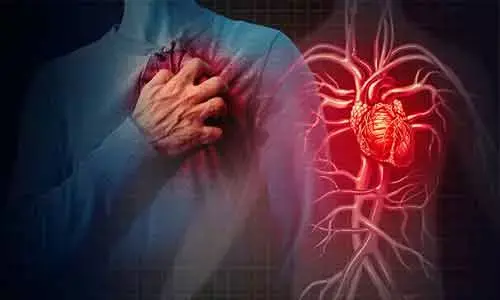- Home
- Medical news & Guidelines
- Anesthesiology
- Cardiology and CTVS
- Critical Care
- Dentistry
- Dermatology
- Diabetes and Endocrinology
- ENT
- Gastroenterology
- Medicine
- Nephrology
- Neurology
- Obstretics-Gynaecology
- Oncology
- Ophthalmology
- Orthopaedics
- Pediatrics-Neonatology
- Psychiatry
- Pulmonology
- Radiology
- Surgery
- Urology
- Laboratory Medicine
- Diet
- Nursing
- Paramedical
- Physiotherapy
- Health news
- Fact Check
- Bone Health Fact Check
- Brain Health Fact Check
- Cancer Related Fact Check
- Child Care Fact Check
- Dental and oral health fact check
- Diabetes and metabolic health fact check
- Diet and Nutrition Fact Check
- Eye and ENT Care Fact Check
- Fitness fact check
- Gut health fact check
- Heart health fact check
- Kidney health fact check
- Medical education fact check
- Men's health fact check
- Respiratory fact check
- Skin and hair care fact check
- Vaccine and Immunization fact check
- Women's health fact check
- AYUSH
- State News
- Andaman and Nicobar Islands
- Andhra Pradesh
- Arunachal Pradesh
- Assam
- Bihar
- Chandigarh
- Chattisgarh
- Dadra and Nagar Haveli
- Daman and Diu
- Delhi
- Goa
- Gujarat
- Haryana
- Himachal Pradesh
- Jammu & Kashmir
- Jharkhand
- Karnataka
- Kerala
- Ladakh
- Lakshadweep
- Madhya Pradesh
- Maharashtra
- Manipur
- Meghalaya
- Mizoram
- Nagaland
- Odisha
- Puducherry
- Punjab
- Rajasthan
- Sikkim
- Tamil Nadu
- Telangana
- Tripura
- Uttar Pradesh
- Uttrakhand
- West Bengal
- Medical Education
- Industry
Higher body fat in women may protect against death due to heart disease: Study

The American Heart Association estimates that 5 million men and 3 million women have heart attacks annually. Yet despite this wide gender gap and an overall decrease in heart attack-related deaths for both men and women over the past 50 years, an equal number of men and women still die from heart disease.
UCLA researchers have found in a new study men and women who have high muscle mass are less likely to die from heart disease.Further it also appears that women who have higher levels of body fat -- regardless of their muscle mass -- have a greater degree of protection than women with less fat.
The study is published in the peer-reviewed Journal of the American Heart Association.
The researchers analyzed national health survey data collected over a 15-year period and found that heart disease-related death in women with high muscle mass and high body fat was 42% lower than in a comparison group of women with low muscle mass and low body fat. However, women who had high muscle mass and low body fat did not appear have a significant advantage over the comparison group.
Among men, on the other hand, while having high muscle mass and high body fat decreased their risk by 26% (compared to those with low muscle mass and low body fat), having high muscle mass and low body fat decreased their risk by 60%.
The researchers analyzed body composition data from the National Health and Nutrition Examination Survey 1999-2004 and cardiovascular disease data from the National Health and Nutrition Examination Survey 1999-2014. They evaluated 11,463 individuals aged 20 and older, who were then divided into four body-composition groups: low muscle mass and low body fat, low muscle and high fat, high muscle and low fat, and high muscle and high fat. Heart disease-related mortality rates where then calculated for each of these groups.
The findings highlight the importance of recognizing physiological differences between women and men when considering body composition and the risk of death from heart disease, particularly when it comes to how differences in body fat may modify that risk.
The research also underscores the need to develop sex appropriate guidelines with respect to exercise and nutrition as preventive strategies against the development of cardiovascular disease. Even with the current emphasis by health experts on reducing fat to lower disease risk, it may be important for women to focus more on building muscle mass than losing weight, the study authors say.
For further reference log on to:
Dr Kartikeya Kohli is an Internal Medicine Consultant at Sitaram Bhartia Hospital in Delhi with super speciality training in Nephrology. He has worked with various eminent hospitals like Indraprastha Apollo Hospital, Sir Gangaram Hospital. He holds an MBBS from Kasturba Medical College Manipal, DNB Internal Medicine, Post Graduate Diploma in Clinical Research and Business Development, Fellow DNB Nephrology, MRCP and ECFMG Certification. He has been closely associated with India Medical Association South Delhi Branch and Delhi Medical Association and has been organising continuing medical education programs on their behalf from time to time. Further he has been contributing medical articles for their newsletters as well. He is also associated with electronic media and TV for conduction and presentation of health programs. He has been associated with Medical Dialogues for last 3 years and contributing articles on regular basis.
Dr Kamal Kant Kohli-MBBS, DTCD- a chest specialist with more than 30 years of practice and a flair for writing clinical articles, Dr Kamal Kant Kohli joined Medical Dialogues as a Chief Editor of Medical News. Besides writing articles, as an editor, he proofreads and verifies all the medical content published on Medical Dialogues including those coming from journals, studies,medical conferences,guidelines etc. Email: drkohli@medicaldialogues.in. Contact no. 011-43720751


